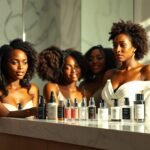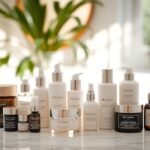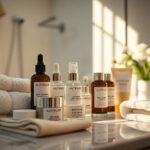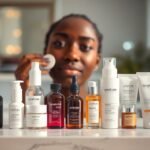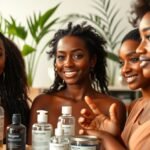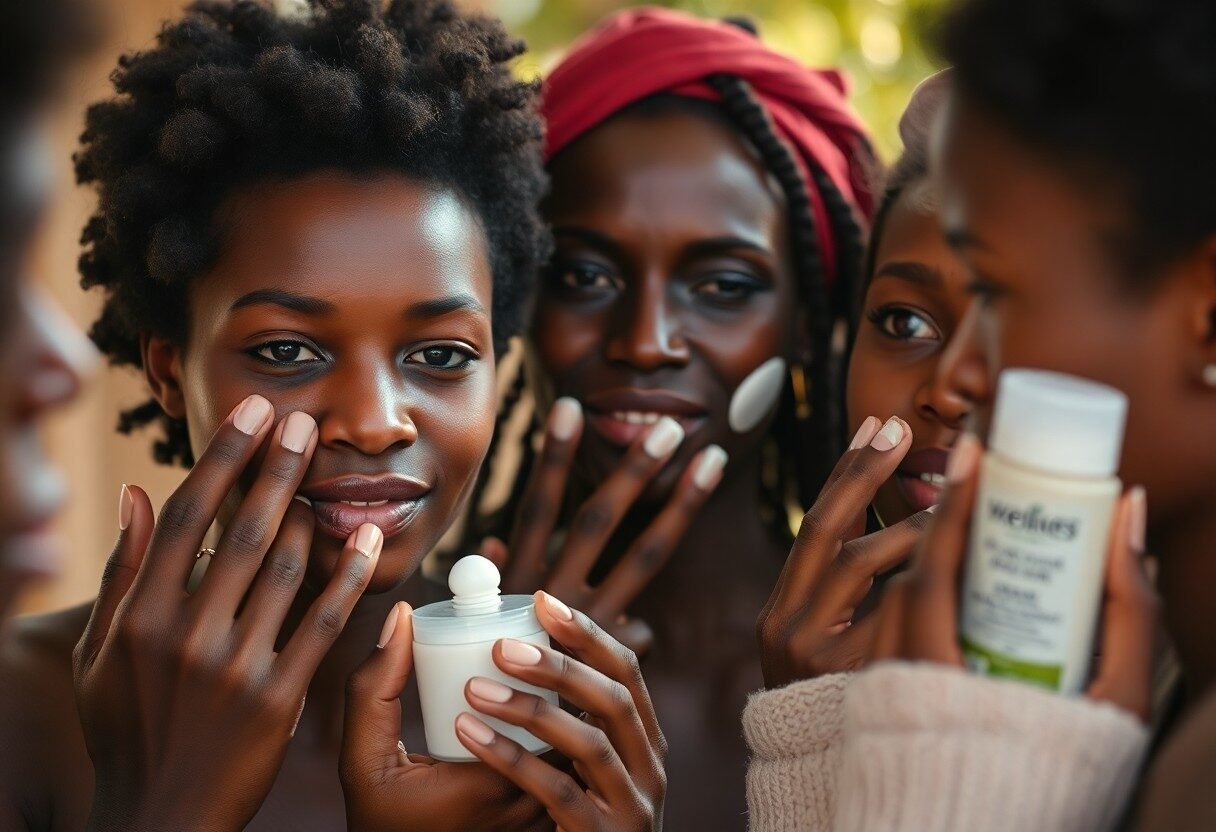
Many individuals with dark skin may struggle to find the right moisturizers that cater specifically to their unique needs. In this guide, I will share my top choices that not only enhance your skin’s moisture retention but also address issues like hyperpigmentation and uneven texture. With the right products, you can achieve a luminous and healthy glow while ensuring that your skin remains well-hydrated and nourished. Join me as we explore the best moisturizers for your beautiful dark skin!
Key Takeaways:
- Look for moisturizers that contain ingredients like shea butter, cocoa butter, and jojoba oil, which provide deep hydration and nourishment.
- Consider products with added antioxidants such as vitamin E and C to help protect dark skin from environmental stressors.
- Opt for creams or lotions that are specifically formulated for dry or sensitive skin types to ensure maximum moisture retention.
- Pay attention to fragrance-free options to minimize the risk of irritation for sensitive skin types.
- Products with gentle exfoliating ingredients like alpha hydroxy acids can help maintain an even skin tone by removing dead skin cells.
- Hydration is imperative, so look for formulations that include hyaluronic acid for hydration without clogging pores.
- SPF protection is important all year round, choose moisturizers with sun protection to help prevent hyperpigmentation.
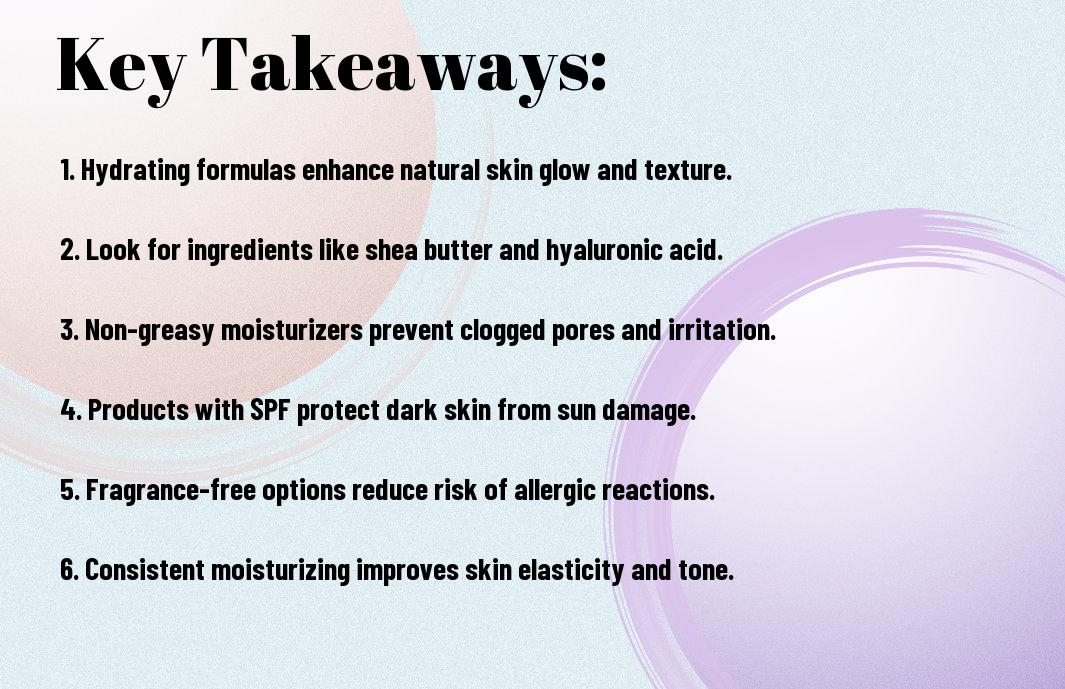
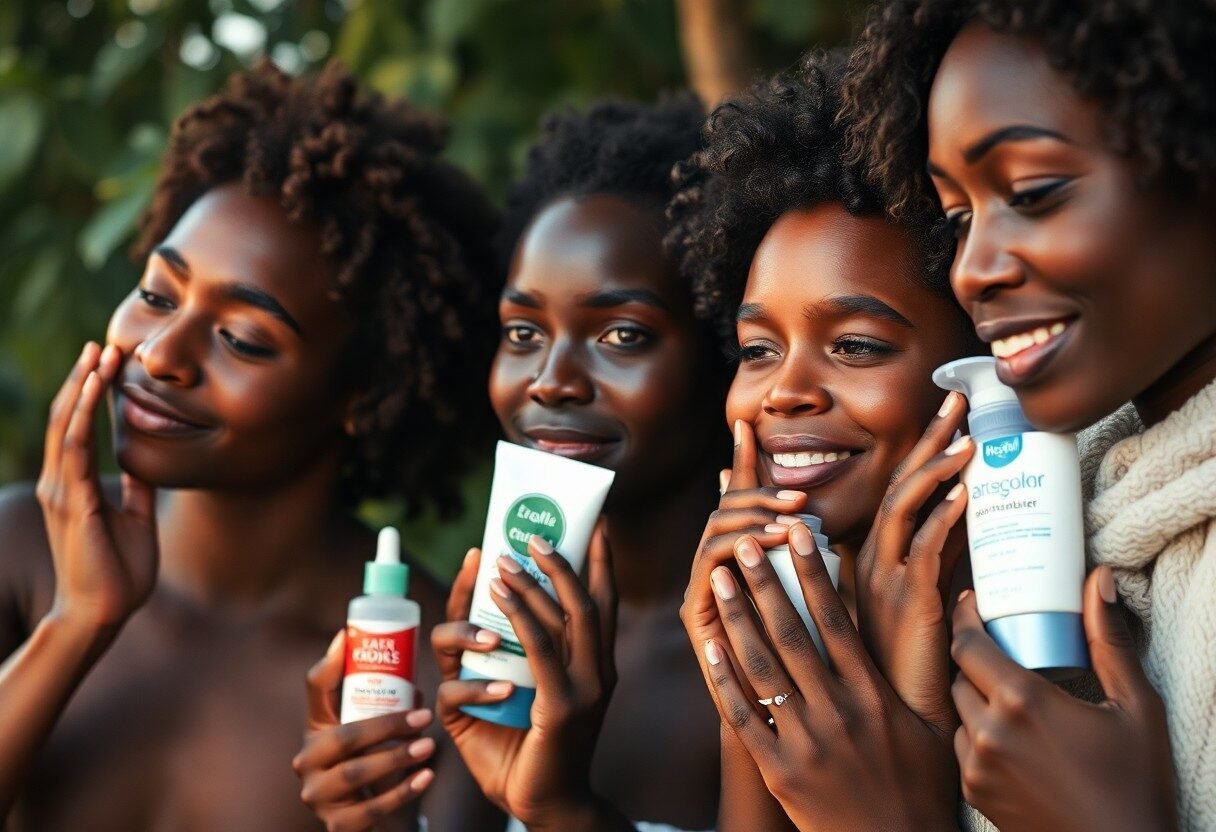
The Unique Hydration Needs of Dark Skin
Skin Structure and Composition
Dark skin has a thicker epidermis and more densely packed melanin, which contribute to its unique structure and resilience. This composition can help provide greater protection against environmental stressors; however, it also means that the natural oils produced may not adequately reach the skin’s surface. The layering of melanin can influence how skin absorbs hydration, necessitating more targeted moisturizing strategies.
Common Challenges in Moisture Retention
Despite its resilience, dark skin often faces challenges in moisture retention, leading to dryness and uneven texture. Factors such as environmental changes, skin conditions, and hormonal fluctuations can exacerbate these issues, leaving the skin feeling parched. Finding a moisturizer that penetrates effectively is vital for promoting hydration.
In my experience, the common challenges in moisture retention for dark skin include susceptibility to conditions like *xerosis* (dry skin) and *atopic dermatitis*. The range of moisture levels can vary greatly; for instance, staying hydrated may be harder in arid climates, while humid environments can disrupt the skin barrier. Incorporating humectants like glycerin and hyaluronic acid in your skincare routine can significantly improve moisture levels and transform your skin’s hydration game.
Key Ingredients That Nourish Dark Skin
Natural Oils and Butters
Oils and butters are crucial in keeping dark skin hydrated and healthy. I often look for products containing shea butter, which is renowned for its deep moisturizing properties, helping to repair the skin’s barrier while providing lasting hydration. Coconut oil is another favorite of mine; its antibacterial properties also aid in soothing irritation, while promoting overall smoothness and elasticity in the skin.
Vitamins and Antioxidants
Incorporating vitamins and antioxidants into your skincare routine can significantly enhance the health of your dark skin. Ingredients like vitamin E and vitamin C are highly beneficial; they combat free radicals and support the skin’s natural regeneration process. Regular application of these vitamins not only nourishes but also brightens the skin tone, promoting an even complexion.
While I often gravitate towards products enriched with these vital vitamins, it’s fascinating to note that vitamin C can also improve collagen production, contributing to firmer skin, especially for those of us focusing on skin elasticity. Meanwhile, vitamin E’s moisturizing properties work harmoniously with antioxidants to prevent premature aging, making it a double-duty ingredient. Hence, choosing products rich in these nutrients is a smart strategy for protective and restorative care tailored for dark skin.
Top Moisturizers for Dark Skin: A Curated List
Best Drugstore Options
Finding effective moisturizers at drugstores can be a game-changer for your skincare routine. I recommend products like Cetaphil Daily Hydrating Lotion and Eucerin Advanced Repair Cream. These options are budget-friendly yet rich in hydrating ingredients such as hyaluronic acid and glycerin, making them perfect for maintaining moisture in your skin without breaking the bank.
Premium Choices Worth the Investment
Luxury moisturizers can offer enriched formulations specifically designed for dark skin. Products like Kiehl’s Ultra Facial Cream and La Mer Moisturizing Cream are favorites among beauty enthusiasts. They contain high-quality ingredients such as squalane and marine extracts, hydrating deeply while improving skin texture over time.
Investing in premium choices can truly transform your skincare game. These creams often boast superior blend quality, featuring advanced technology and potent active ingredients that enhance skin’s natural radiance. For example, Kiehl’s Ultra Facial Cream provides 24-hour hydration with a lightweight feel, making it suitable for daily use. Choosing products like this can result in a visibly smoother and more even-toned complexion, crucial for maintaining healthy dark skin.
Specialized Products for Specific Concerns
For specific skin concerns like hyperpigmentation and uneven texture, targeted moisturizers can be very effective. I find that products like Purpose Dual Treatment Moisturizer and Ambi Skincare Fade Cream are great options. These formulations often include brightening agents like kojic acid or vitamin C that work to even out your skin tone while providing hydration.
Choosing specialized products tailored to your concerns can make a significant difference in your skincare routine. For instance, Ambi’s formula not only keeps your skin hydrated but also addresses dark spots, making it a great two-in-one solution. The unique combination of moisturizing and brightening properties means you can target specific issues effectively, allowing for a more comprehensive approach to enhancing the overall appearance of your skin.
The Role of SPF in Moisturizing
Importance of Sun Protection for Dark Skin
Dark skin has higher melanin levels, which can offer some natural protection against UV rays. However, this does not make you immune to sun damage. The risk of hyperpigmentation and skin damage from sun exposure remains a concern for all skin types, including dark skin. Daily sun protection can help maintain an even skin tone, prevent premature aging, and lower the risk of skin cancer. Incorporating SPF into your routine is a vital step in preserving your skin’s health and appearance.
Dual-Function Products
Opting for moisturizers that also contain SPF can streamline your routine while keeping your skin protected. Dual-function products not only hydrate your skin but also provide crucial sun protection, eliminating the need for multiple layers of products. This can save you time, while ensuring your skin benefits from both moisture and UV defense without feeling heavy or greasy.
Finding a moisturizer that doubles as sunscreen can be a huge advantage, especially for darker skin tones that may struggle with ashy residues from traditional sunblock. Some of the best formulas available on the market combine hydrating ingredients like hyaluronic acid or shea butter with broad-spectrum SPF 30 or higher. For example, a moisturizer containing zinc oxide or titanium dioxide can offer physical sun protection without leaving a white cast, which is often a concern for those with darker complexions. Brands like Black Girl Sunscreen are specifically designed to cater to this need, ensuring you stay protected while enjoying healthy, glowing skin.
Application Techniques for Maximum Efficacy
Timing and Frequency of Application
For optimal results, applying your moisturizer twice daily—once in the morning and once at night—can significantly enhance your skin’s hydration levels. I often recommend using a heavier moisturizer at night when your skin is in repair mode. This timing allows the product to penetrate deeply and work its magic while you sleep. In the morning, a lighter formulation prepares your skin for makeup and environmental exposure without feeling greasy.
Layering Products for Optimal Results
Combining moisturizers with serums or oils can elevate your skincare routine to new heights. Start with a lightweight serum packed with antioxidants or hyaluronic acid, followed by your chosen moisturizer. This layering ensures that your skin receives multiple hydration levels while catering to specific needs, like brightness or firmness.
The effectiveness of layering products lies in building a customized routine that targets your unique skin concerns. For instance, if you’re aiming for extra hydration, layering a nourishing oil beneath your cream can create a protective barrier that locks in moisture. Alternatively, for those with acne-prone skin, a lightweight gel-based moisturizer can be layered over a topical treatment for added hydration without clogging pores. Tailoring this approach not only enhances hydration but also ensures your dark skin type receives the focused benefits it deserves.
Debunking Myths: Moisturizers and Dark Skin
Misconceptions About Oily Skin
Many people assume that darker skin types are inherently oily and, therefore, do not require as much hydration. This is a misconception; just like any skin type, dark skin can experience dryness, especially due to environmental factors or seasonal changes. Even those with oily skin can suffer from dehydration, which is characterized by a lack of moisture, not oil. Proper hydration is important for all skin types to promote overall health and vitality.
Clarifying Hydration vs. Moisture
Understanding the difference between hydration and moisture is key to selecting the right products for your dark skin. Hydration refers to the water content in your skin, while moisture pertains to the oils that seal that hydration in. A well-balanced moisturizer should address both aspects to ensure your skin remains healthy and radiant.
Hydration is often achieved through ingredients like hyaluronic acid and glycerin, which draw moisture to the skin, whereas moisture relies on occlusive agents such as shea butter or oils that retain that hydration. For optimal skin health, choose a moisturizer that combines both hydrating and moisturizing elements. This way, you can combat dryness and maintain that sought-after glow, regardless of your skin type. Emphasizing both aspects in your skincare routine can make all the difference in achieving radiant skin that feels as good as it looks.
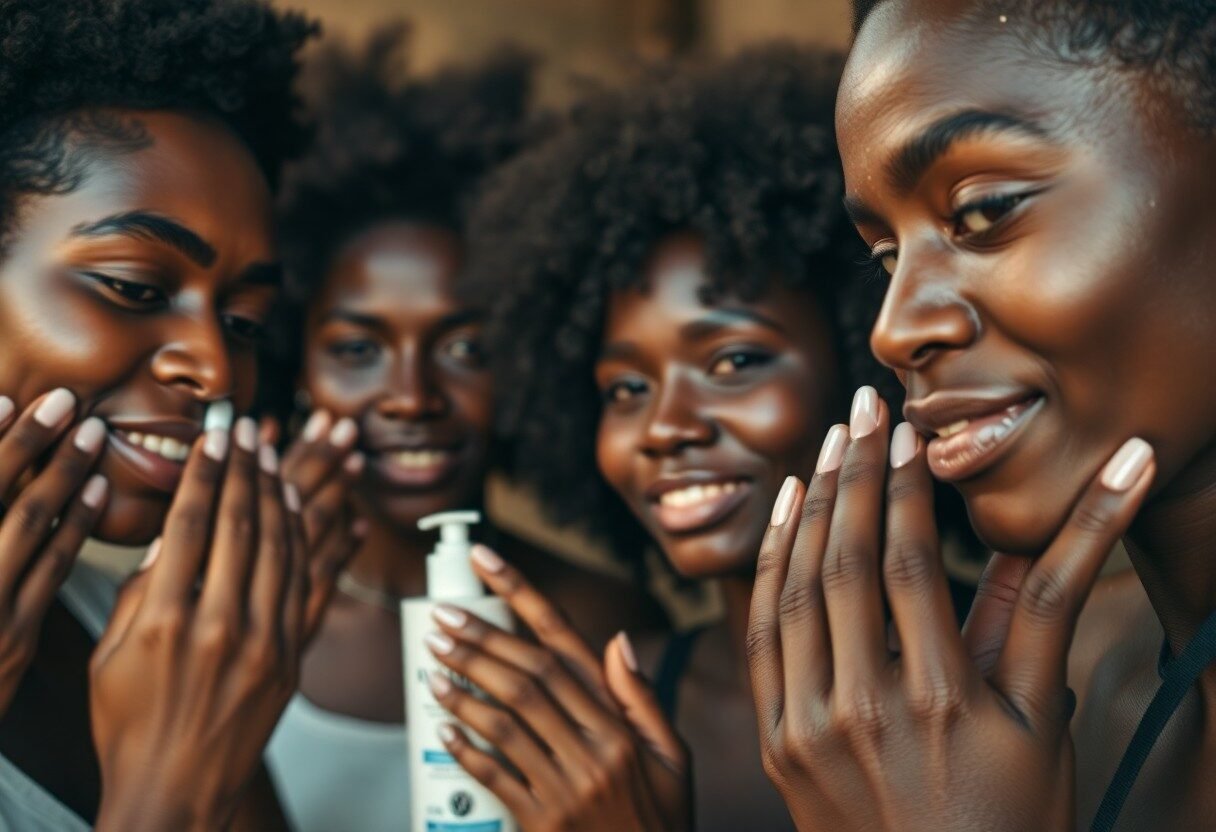
Insights from Dermatologists: What Professionals Recommend
Expert Opinions on Products
Consulting with dermatologists can lead to valuable recommendations for moisturizers that cater specifically to dark skin. Many professionals suggest looking for products that feature ingredients like shea butter, which is known for its deep moisturizing properties, or hyaluronic acid for its ability to attract moisture. Additionally, a few clinicians advocate for products that are free from harsh chemicals and irritants, emphasizing a gentle approach that respects your skin’s needs.
Tips for Personalizing Your Moisturizing Routine
Finding the perfect moisturizer involves some personal experimentation. I recommend assessing your skin type—whether it’s oily, dry, or combination—as this will influence the kind of products you should choose. Consider seasonal changes too; for instance, a richer cream might be beneficial in winter when your skin tends to lose moisture. Additionally, always patch test new products to ensure compatibility.
- Define your skin type to choose appropriate products.
- Experiment with moisturizers based on seasonal weather.
- Patch test new products for compatibility.
Recognizing the unique nature of your skin will allow you to customize your moisturizing regimen effectively. For instance, if you notice increased dryness after using a certain product, you may want to switch to one with more natural oils or a heavier consistency. Observing how your skin reacts and adjusting your routine accordingly will yield the best results.
- Monitor how your skin reacts to moisturizers over time.
- Consider adding layered hydration techniques for enhanced moisture.
- Stay consistent in your routine for optimal results.
Recognizing the importance of consistency in your moisturizing routine cannot be understated. By applying moisturizer regularly and allowing your skin to adapt to your chosen products, you’ll likely see improved hydration and overall skin health. Keeping a few go-to products that work for you can also streamline the process, making it easier to maintain your glowing complexion.
Final Words
The best moisturizers for dark skin are vital for achieving hydrated, radiant skin. I encourage you to look for formulations that cater specifically to your skin type, focusing on hydrating ingredients like shea butter, glycerin, and hyaluronic acid. By understanding your unique needs and experimenting with different products, I believe you’ll find the right moisturizer that not only enhances your natural beauty but also ensures your skin stays healthy and nourished. Your skin deserves the best, so invest time in finding the perfect match for your needs.
FAQ
Q: What should I look for in a moisturizer for dark skin?
A: When choosing a moisturizer for dark skin, look for ingredients that provide hydration and nourishment. Key ingredients include shea butter, coconut oil, glycerin, and hyaluronic acid. Additionally, opt for products that contain antioxidants, such as vitamins C and E, which can help improve skin tone and protect against environmental damage.
Q: Are there specific moisturizers recommended for hyperpigmentation?
A: Yes, moisturizers that contain ingredients known to brighten the skin are beneficial for hyperpigmentation. Look for products with niacinamide, licorice extract, or alpha arbutin, as these can help even out skin tone and reduce dark spots. Always test products on a small area first to gauge their effectiveness and any potential irritation.
Q: How often should I apply moisturizer to my skin?
A: It’s generally recommended to apply moisturizer twice daily, once in the morning and once before bedtime. This helps to keep the skin hydrated and maintains its moisture barrier. If your skin feels especially dry, you may benefit from additional applications throughout the day.
Q: Is it necessary to use a moisturizer with SPF for darker skin tones?
A: While darker skin tones have higher melanin content, which offers some natural protection against UV rays, using a moisturizer with SPF is still important. Sunscreen helps prevent sun damage and reduces the risk of uneven skin tone and hyperpigmentation. Look for a broad-spectrum SPF 30 or higher for optimal protection.
Q: Can I use a moisturizer if I have oily skin?
A: Absolutely! Individuals with oily skin can benefit from moisturizers, but it’s important to choose lightweight, non-comedogenic products that won’t clog pores. Look for gel-based or water-based moisturizers containing ingredients like hyaluronic acid or aloe vera for hydration without excess oil.
Q: Are fragrance-free moisturizers better for dark skin?
A: Fragrance-free moisturizers are often preferable for all skin types, including dark skin. Fragrances can irritate sensitive skin and cause allergic reactions. Opting for fragrance-free formulations can help minimize potential skin issues, ensuring the product is gentle and suitable for daily use.
Q: How can I tell if a moisturizer is suitable for my skin type?
A: To determine if a moisturizer is suitable for your skin type, consider your skin’s texture and needs. If your skin is dry, look for rich creams or butters. For oily skin, seek out lightweight gels. Conduct a patch test before fully applying the product to check for any adverse reactions, and observe how your skin responds over a few days.
